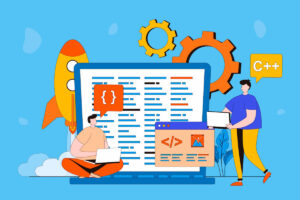PHP, which stands for Hypertext Preprocessor, is a widely used open-source scripting language that is especially suited for web development and can be embedded into HTML. Over the years, PHP has evolved and adapted to the changing landscape of technology, making it a popular choice for developers worldwide. In India, PHP has a strong presence in the development community, with many companies and developers relying on PHP for their projects. In this article, we will explore the current trends in PHP technology and its future in the development scene in India.
Current Trends in PHP Technology
1. PHP 7
- The latest version of PHP, PHP 7, has brought significant performance improvements and new features to the language. With faster execution times and improved memory usage, PHP 7 has become the preferred choice for many developers.
- The adoption of PHP 7 in India has been steadily increasing, with more and more developers upgrading their projects to take advantage of the new features and performance improvements.
- PHP 7 also introduces scalar type declarations, return type declarations, anonymous classes, and many other features that enhance the developer experience and code quality.
2. Frameworks
- PHP frameworks such as Laravel, Symfony, and CodeIgniter have gained popularity among developers in India. These frameworks provide a structured way to build web applications and simplify the development process.
- Laravel, in particular, has seen widespread adoption in India due to its elegant syntax, powerful features, and active community support.
- Symfony, known for its flexibility and scalability, has become a favorite choice for developers working on large-scale projects in India.
-
3. Microservices Architecture
- With the rise of microservices architecture, PHP developers in India are increasingly breaking down their applications into smaller, independent services. This approach allows for greater scalability, flexibility, and maintainability of web applications.
- Using PHP in a microservices architecture enables developers to build complex systems that are easier to manage and scale as needed.
- Tools like Docker and Kubernetes are commonly used in conjunction with PHP to deploy and manage microservices effectively.
Future of PHP Development in India
1. Artificial Intelligence and Machine Learning
- As artificial intelligence and machine learning technologies continue to advance, PHP developers in India will need to adapt and incorporate these technologies into their projects.
- Integrating AI and ML capabilities into PHP applications can enhance user experiences, automate processes, and provide valuable insights for businesses.
- PHP developers can leverage libraries like TensorFlow and scikit-learn to implement AI and ML algorithms in their applications.
2. Internet of Things (IoT)
- The Internet of Things is another burgeoning technology trend that will impact PHP development in India. PHP developers will need to be adept at creating applications that can communicate with and control IoT devices.
- PHP frameworks like Symfony and Laravel provide the tools and resources needed to build IoT applications that can interact with a wide range of devices and sensors.
- MQTT protocol is commonly used by PHP developers to establish communication between IoT devices and backend systems.
3. Progressive Web Apps (PWAs)
- Progressive Web Apps are becoming increasingly popular due to their ability to deliver a native app-like experience on the web. PHP developers in India will need to focus on building PWAs that are fast, reliable, and engaging.
- Using PHP frameworks and tools like Service Workers and Web App Manifests, developers can create PWAs that offer offline capabilities, push notifications, and seamless user experiences.
- Implementing strategies like lazy loading and caching can further enhance the performance of PWAs developed using PHP.
4. Cybersecurity
- With the growing concern over cybersecurity threats and data breaches, PHP developers in India will need to prioritize security in their applications. Implementing secure coding practices, encryption, and authentication mechanisms will be crucial in protecting sensitive data.
- Tools like PHP Security Advisories and OWASP Top 10 can help developers stay informed about the latest security vulnerabilities and best practices for securing PHP applications.
- Regular security audits and penetration testing should be conducted to identify and mitigate potential vulnerabilities in PHP applications.
In conclusion, PHP technology trends are rapidly evolving, and the future of development in India looks promising for PHP developers. By staying up-to-date with the latest trends and technologies, PHP developers can continue to build innovative and cutting-edge web applications that meet the demands of the modern digital landscape.
This content is written by a SEO content writing expert with fluent English.
FAQs:
1. What is the latest version of PHP?
- The latest version of PHP is PHP 7, which brings significant performance improvements and new features to the language.
2. Which PHP frameworks are popular among developers in India?
- PHP frameworks such as Laravel, Symfony, and CodeIgniter have gained popularity among developers in India for building web applications.
3. How are PHP developers in India utilizing microservices architecture?
- PHP developers in India are breaking down their applications into smaller, independent services using microservices architecture for greater scalability, flexibility, and maintainability.
4. What aspect of modern web development are PHP developers in India focusing on?
- PHP developers in India are focusing on API development to create seamless integrations between different systems and services using tools like RESTful APIs and GraphQL.












+ There are no comments
Add yours